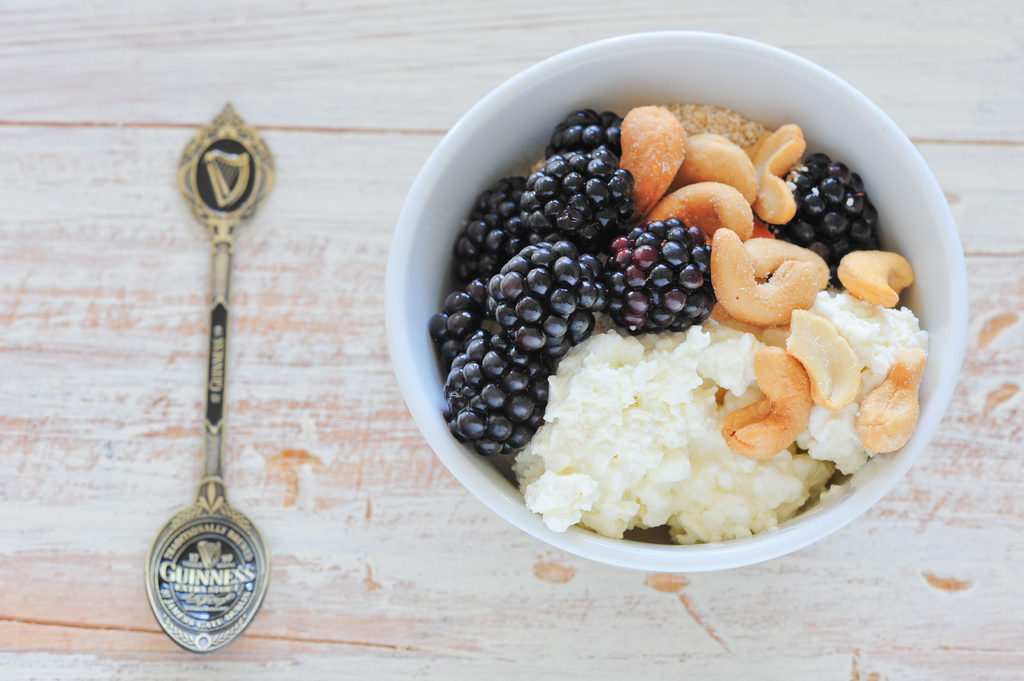Cottage cheese is one of those foods that you might be unsure if it is fattening if you never read the nutrition labels. It may seem fattening because it can taste super creamy and possibly dessert like at times. While on the other hand, we have likely heard at times that cottage cheese is healthy for weight loss or maintenance and full of essential nutrients. As with many food products, the nutrition varies based on brand and milkfat percent. Let’s take a closer look at the nutrition of cottage cheese.
Is Cottage Cheese Fattening?
Sugar in Cottage Cheese
Cottage cheese is made from milk. Milk contains a sugar know as lactose, therefore, all milk based cottage will contain sugar. Lactose sugar is natural and should not be a concern for most people, unless they have lactose intolerance or lactose sensitivity. Sugar becomes a problem when it is added to cottage cheese above and beyond the naturally occurring lactose sugar. Read the label to determine if cottage cheese has added sugar. Ingredients such as corn syrup, cane juice, and of course sugar should be avoided if you are concerned with cottage cheese being fattening. Particularly avoid cottage cheese with prepackaged fruit toppings because these routinely have added sugar in the fruit mix.

Fat in Cottage Cheese
Most cottage cheese brands provide various milkfat percentages for their cottage cheese products. The typical milkfat percentages are fat free, 1 percent, 2 percent, and 4 percent. One cup of 4 percent cottage cheese has about 9.5 grams of fat, 2 percent has approximately 5 grams, one percent has around 2.5 grams, and fat free has .5 grams or less. Fat is essential to the diet, but it should be limited to less than 30 percent of your total calories for most people. A gram of fat contains 9 calories, therefore, non-fat or lower milkfat products will have the lowest calories and be less fattening.
Carbs in Cottage Cheese
A benefit to eating cottage cheese is that the carbs are low for most products. We recently took a sample of major cottage cheese brands and found the average carbs per half cup to be about 5-6 grams. This is minimal assuming you are not following an aggressive carb restricted diet. Cottage cheese with prepackaged fruit topping can more than double the carbs of plain cottage cheese. It is best to stay away from these products or limit your portion if you are concerned with fattening cottage cheese.
Calories in Cottage Cheese
The calories in cottage cheese vary from brand to brand and product to product. Cottage cheese has the following calories per one cup based on the United States Department of Agriculture (USDA) Nutrient Database:
Fat Free: 104 calories
1% Milkfat: 163 calories
2% Milkfat: 183 calories
4% Milkfat: 219 calories
The calories in cottage cheese vary greatly from fat free (104 calories) to 4 percent milkfat (219 calories). The best option is clearly fat free, but obviously taste may be a factor some.
Conclusion
As with many foods, cottage cheese can or cannot be fattening depending on which product you select and the portion size. Cottage cheese is fattening if you choose a full fat (4%) variety, add a sugary topping, and eat more than the recommended serving. It is not fattening if you limit your portion size and eat a lower fat options. All products are different so reviewing the nutrition facts on the label is vital if you are concerned with eating a fattening cottage cheese.

